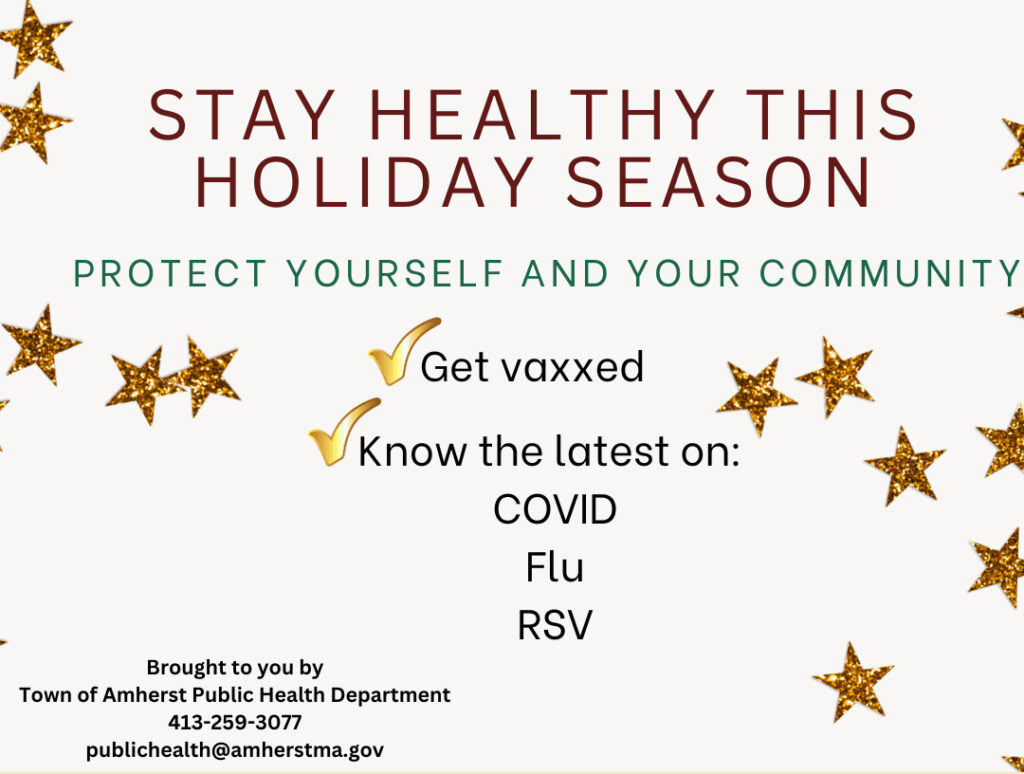COVID and Respiratory Illness Update and Health Tips

Photo: amherstma.gov
Source: Amherst Health Department
As the colder weather and the holiday season approach – with more people gathering inside and in larger numbers – it’s a good idea to adopt some strategies to prevent respiratory illness, including the flu, COVID and RSV (respiratory syncytial virus).
Many of us are tired from years of taking precautions to avoid the spread of COVID. This fatigue is understandable! The current level of respiratory disease is lower now that it was at this time last year and is closer to pre-pandemic levels. The current wastewater surveillance reports show a slight rise in COVID levels but they are not yet considered substantial as of this update and are quite a bit lower than our last peak in the fall. Even with COVID illness generally being milder and less of a concern, respiratory illness in general is still a common occurrence around the holidays, so it’s worth doing a few simple things to help everyone stay as healthy as possible this winter season.
- Get vaccinated!
- Flu and COVID vaccines are widely available in our community through primary care providers or at pharmacies. The Town is offering one final vaccine clink before the holidays on December 21st from 11:00 am to 12:30 pm at the Bangs Center. Click here for more information.
- RSV: is a common respiratory virus that usually causes mild, cold-like symptoms. Most people recover in a week or two, but RSV can be serious. Infants and older adults are more at risk for severe disease from RSV infection. The RSV vaccine is available for adults aged 60 and over. Pregnant individuals can receive an RSV vaccine between 32 and 36 weeks of pregnancy to protect their infant after birth. Talk to your health care provider to see if an RSV vaccine is right for you.
- Practice infection prevention
- Wash your hands often with soap and water for at least 20 seconds
- Avoid touching your eyes, nose and mouth
- Cough or sneeze into your elbow or a tissue and throw out tissues after use
- Avoid close contact with people who are sick
- Clean frequently touched surfaces and objects with soap and water or a disinfectant
- Improve indoor air quality by increasing ventilation and/or running an air filter
- If you have symptoms(runny nose, coughing, sneezing, body aches, fever)
- Stay home
- Allow yourself time to rest and recover and minimize the spread of illness to others
- Take a home COVID test
- If you test positive, follow the isolation guidance, which include isolating for the first five days of illness and masking in public from days 6 to 10.
- If you test negative, you do not need to isolate, but it is recommended that you stay home and/or wear a mask in public until you feel well so as to minimize the spread of respiratory illness to others. It is also recommended that you do another home test in 48 hours to confirm the negative result.
- Stay home
- If you were exposed to someone with COVID but do not have symptoms, follow the exposure guidance, which include wearing a high-quality mask when you are around others indoors for 10 days from when you were exposed.
- Take care of yourself and seek treatment if necessary
- Most people with respiratory illness have mild cases and can recover at home. Rest, fluids and over-the-counter medications such as acetaminophen or ibuprofen are usually all that’s needed.
- Older adults, people with underlying medical conditions and people who are unvaccinated are more likely to get severe illness resulting from COVID or flu infection. Pregnant individuals and young children may also have a higher risk of flu complications. There are medications to treat both COVID and flu that may help. They must be prescribed by a health care provider and started within a few days after symptoms begin. If you fall into any of these increased risk categories, do not delay contacting your health care practitioner if you feel you may need treatment.
Please reach out to the Public Health Department with any questions about COVID and other respiratory illness. You can email us at publichealth@amherstma.gov or call 413 259 3077.
